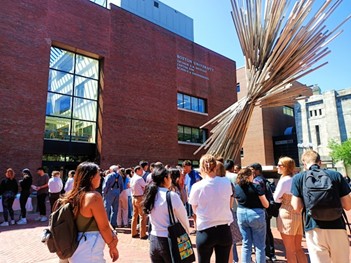
Choosing a college path is an exciting yet complex decision for many students. For those aiming to maximize their academic opportunities, pursuing a double major or an interdisciplinary program can provide unparalleled flexibility and prepare them for diverse career paths. When researching top colleges in the USA, it becomes clear that institutions increasingly support students who wish to explore multiple fields of study, reflecting the growing demand for versatility in higher education. Successfully navigating these programs requires strategic planning, careful time management, and a clear understanding of how to integrate disparate disciplines.
Double majors and interdisciplinary programs are designed to allow students to study two or more fields either simultaneously or in a connected, cross-disciplinary manner. A double major typically involves completing the full set of requirements for two distinct academic departments. For instance, a student may choose to major in economics and computer science, fulfilling the core requirements for both disciplines. Interdisciplinary programs, on the other hand, often combine elements from multiple fields into a single, integrated curriculum, such as environmental studies, cognitive science, or data analytics, allowing students to address complex problems from multiple perspectives.
Both approaches offer distinct advantages. Double majors can enhance career marketability, demonstrate a student’s ability to manage rigorous workloads, and provide in-depth knowledge in two areas.
Likewise, interdisciplinary programs foster critical thinking, problem-solving skills, and the capacity to synthesize information across domains. Students interested in either path should carefully assess how each aligns with their academic interests, career aspirations, and long-term goals.
One of the keys to success is early and careful planning. Students should begin by understanding the course requirements, prerequisites, and sequencing for both areas of study. Meeting with academic advisors, departmental faculty, and career counselors can provide valuable insight into how to navigate the curriculum efficiently. Creating a multi-year academic plan that maps out courses, research opportunities, and potential electives is essential for avoiding scheduling conflicts and ensuring that all requirements are met.
Time management becomes critical in these programs. Balancing coursework from two or more disciplines often requires taking a higher course load or strategically enrolling in summer sessions. Students should be realistic about their capacities, ensuring that they can maintain both academic performance and overall well-being. Developing organizational strategies, such as digital planners, course trackers, and regular check-ins with advisors, can make the process manageable and reduce the risk of burnout.
For students in interdisciplinary programs, the ability to connect concepts across different fields is both a challenge and an opportunity. These programs encourage exploration beyond the traditional boundaries of a single department, promoting creative approaches to complex problems. A student studying neuroscience and philosophy, for example, might examine ethical considerations in brain research, while one in environmental science and public policy could develop strategies to implement sustainable initiatives at the governmental level.
The interdisciplinary approach also provides a competitive edge in the job market. Employers increasingly value candidates who can integrate knowledge from multiple domains, analyze problems holistically, and adapt to rapidly changing industries. Students who can demonstrate the practical application of interdisciplinary learning often stand out as versatile, forward-thinking professionals.
Double majors and interdisciplinary programs are inherently demanding. Students should be prepared to manage increased coursework, maintain consistent grades, and balance extracurricular or research commitments. Developing strong study habits, including regular review sessions, effective note-taking, and time-blocked study periods, is essential. It may also be beneficial to form study groups with peers from both disciplines to foster collaboration and reinforce understanding of challenging material.
While the workload can be intense, students who approach their studies strategically often find the experience highly rewarding. Prioritizing tasks, breaking projects into manageable steps, and utilizing campus resources, such as tutoring centers, writing labs, and faculty office hours, can mitigate stress and enhance learning outcomes.
One of the greatest benefits of pursuing a double major or interdisciplinary program is access to diverse research and experiential learning opportunities. Many universities encourage students to engage in undergraduate research, internships, or service-learning projects that span multiple fields of study. These experiences allow students to apply theoretical knowledge to real-world challenges, develop professional skills, and build networks across industries.
For instance, a student combining computer science and biology could join a bioinformatics research lab. Another exploring sociology and data analytics might work on community-based projects using large datasets. These experiences not only reinforce learning but also enhance résumés and prepare students for graduate study or competitive job markets.

When pursuing multiple majors or interdisciplinary programs, it is crucial to develop a cohesive narrative that ties together different academic experiences. Students should be able to articulate how their combined studies reflect intellectual curiosity, critical thinking, and adaptability. This narrative is important not only for graduate school applications but also for internships, fellowships, and employment opportunities.
Crafting a personal statement, portfolio, or résumé that highlights the connections between different fields demonstrates the ability to integrate diverse knowledge and approach challenges creatively. Faculty mentors and career advisors can provide guidance on how to frame this narrative effectively.
Pursuing double majors or interdisciplinary programs can involve navigating administrative complexities, such as cross-departmental registration policies, credit transfer requirements, or differing graduation criteria. Staying informed about institutional policies and maintaining clear communication with academic advisors is essential. Being proactive about deadlines, course availability, and degree audits helps prevent delays and ensures a smooth path to graduation.
Additionally, students should be aware of potential financial implications. Additional coursework or summer sessions may increase tuition costs, and careful planning can help manage these expenses. Many universities offer scholarships or funding opportunities for students in interdisciplinary programs, and exploring these options can provide financial relief while supporting academic goals.
Engaging with faculty, peers, and alumni across multiple departments can also provide access to mentorship, collaborative projects, and career opportunities. Networking within multiple professional spheres. This broadens career prospects and enhances employability.
Participation in professional organizations, conferences, and interdisciplinary seminars further strengthens networks and exposes students to emerging trends and innovations within multiple fields. These connections often prove invaluable when seeking internships, research positions, or full-time employment after graduation.
A critical consideration for students pursuing multiple majors or interdisciplinary programs is finding the right balance between breadth and depth. While exploring multiple disciplines provides a broad knowledge base, it is important to achieve a level of mastery in each area to demonstrate competence and credibility. Strategic course selection, research focus, and experiential learning can help ensure that students gain both the depth and breadth necessary to excel academically and professionally.
Double majors and interdisciplinary programs offer a powerful way for students to maximize flexibility, explore diverse interests, and prepare for an evolving job market. Successfully navigating these paths requires thoughtful planning, effective time management, and strategic engagement with research, internships, and extracurricular activities. By aligning academic choices with personal goals, developing a cohesive narrative, and leveraging institutional resources, students can create a rich, multifaceted college experience. These programs not only enhance intellectual growth but also foster adaptability, problem-solving skills, and professional readiness, ultimately positioning graduates to thrive in a complex and interdisciplinary world.